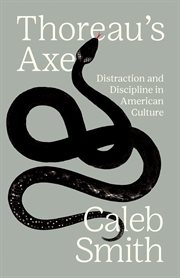Nonfiction
eBook
Details
PUBLISHED
Made available through hoopla
DESCRIPTION
1 online resource
ISBN/ISSN
LANGUAGE
NOTES
Caleb Smith is professor of English at Yale University. He is the author of The Prison and the American Imagination and The Oracle and the Curse and the editor of The Life and the Adventures of a Haunted Convict. His writing has appeared in the Los Angeles Review of Books, n+1, and other publications. How nineteenth-century "disciplines of attention" anticipated the contemporary concern with mindfulness and being "spiritual but not religious" Today, we're driven to distraction, our attention overwhelmed by the many demands upon it-most of which emanate from our beeping and blinking digital devices. This may seem like a decidedly twenty-first-century problem, but, as Caleb Smith shows in this elegantly written, meditative work, distraction was also a serious concern in American culture two centuries ago. In Thoreau's Axe, Smith explores the strange, beautiful archives of the nineteenth-century attention revival-from a Protestant minister's warning against frivolous thoughts to Thoreau's reflections on wakefulness at Walden Pond. Smith examines how Americans came to embrace attention, mindfulness, and other ways of being "spiritual but not religious," and how older Christian ideas about temptation and spiritual devotion endure in our modern ideas about distraction and attention. Smith explains that nineteenth-century worries over attention developed in response to what were seen as the damaging mental effects of new technologies and economic systems. A "wandering mind," once diagnosed, was in need of therapy or rehabilitation. Modeling his text after nineteenth-century books of devotion, Smith offers close readings of twenty-eight short passages about attention. Considering social reformers who designed moral training for the masses, religious leaders who organized Christian revivals, and spiritual seekers like Thoreau who experimented with regimens of simplified living and transcendental mysticism, Smith shows how disciplines of attention became the spiritual exercises of a distracted age. "A fascinating meditation on 'the "infinite bustle" of modern life.'"---Robert M. Thorson, Wall Street Journal "A fascinating new book."---Craig Fehrman, Boston Globe "With a colloquial tone, Smith makes a solid case that the contemporary take on distraction. . . is an old one that came about in the 19th century. . . . The result is a rousing academic study on the meanings of mindfulness." "[An] elegant anthology of American anxieties over attention."---Michael Ledger-Lomas, The Spectator "Smith's historicization of what he calls 'disciplines of attention' offers a useful check on reactionary nostalgia. Taking the measure of the distractions of the digital present requires caution."---Len Gutkin, Chronicle Review "[A] fascinating book. . . . Smith's analyses are incisive and well researched. . . . Collectively they form an intriguing study of the moral framework around distraction and attention during this period." "Thoreau's Axe [is] a work structured like a book of devotion, offering twenty-eight 'readings' that traverse two centuries of discourse on attention, and how various figures, from poets to preachers to reformers, have attempted to inculcate it. . . . [Smith] has the deep and natural orientation of a historian, in his approach to archives and strange and curious corners of nineteenth-century American thought."---Rachel Kushner, Harper's "Anxieties over attention and distraction are nothing new but also, and more to the point, [Smith] raises an enduring cultural contradiction: like Thoreau, many of us feel distracted by shifts and accelerations in collective life-by new media, to be sure, but also by capitalism and its myriad crises-and yet, to combat these collective distractions, we turn inward and desperately try to become more disciplined, attentive individuals. . . . Smith is not the first to name this tension, though his 'genealogy of distraction and the disciplines of att
Mode of access: World Wide Web







